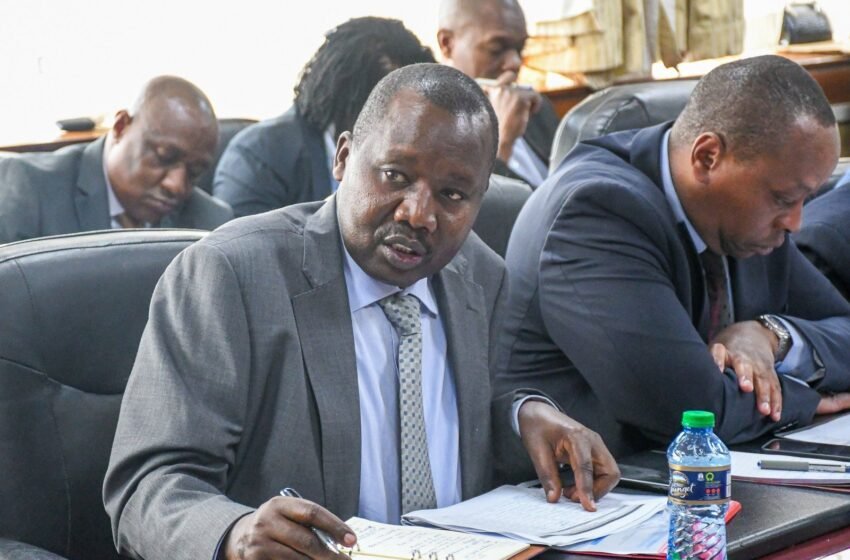A Controversial Road Construction Tender Lands in Court: KeRRA’s Director General Philemon Kandie

Director General Philemon Kandie
Director General Philemon Kandie
A controversial road construction tender worth Sh1 billion has recently landed in court, bringing the Kenya Rural Roads Authority (KeRRA) and its Director General Philemon Kandie into the spotlight. This case has raised significant concerns about the integrity and transparency of the procurement process within one of Kenya’s key infrastructure agencies.
Information
KeRRA, tasked with the development and maintenance of rural roads in Kenya, plays a crucial role in the country’s infrastructure development. Recently, Kenya Insights highlighted issues surrounding a particular tender where DG Philemon Kandie dismissed concerns over its credibility, claiming that the tender was final regardless of procedural adherence, with backing from influential figures.
The Tender Controversy
At the heart of the controversy is a Sh1 billion tender aimed at upgrading several roads in Kisii County to bitumen standards. Businessman Francis Kinyua Mwangi has challenged the tendering process, alleging multiple violations of the Public Procurement and Asset Disposal Act.
Legal Actions Taken
In court documents, Kinyua, represented by lawyer Simon Mburu, seeks an injunction to halt the awarding of the tender to Shengli Construction. He argues that the process was flawed and did not adhere to legal standards.
Public Procurement and Asset Disposal Act
The Public Procurement and Asset Disposal Act is designed to ensure that public procurement is conducted fairly, transparently, and efficiently. Kinyua’s case hinges on alleged breaches of this Act, including issues with the evaluation and award of the tender.
The Roads Involved
The tender covers the upgrade of several critical roads in Kisii County, including Metembe-Owalo-Rioma and Marani-Ng’enyi/Tin’ga Bobaracho Ragogo Kegogi Nyakoora Rioma Gesieka – Nyaore Marani Roads. These upgrades are vital for improving connectivity and economic activities in the region.
KeRRA’s Response
DG Philemon Kandie has dismissed concerns about the tender’s integrity, stating that the process was conducted appropriately. Official communications from KeRRA have emphasized their commitment to re-evaluating the bids in response to public concerns.
Accusations of Favoritism
Kinyua alleges that KeRRA’s tendering process unfairly favored Shengli Construction, resulting in potential financial losses for taxpayers. He points out that another responsive bid from Guangxi Hydroelectric Company was disregarded due to minor errors, which he believes is indicative of favoritism.
Public Procurement Review Board’s Observations
The Public Procurement Review Board has made several observations regarding the tender process. These include concerns about the fairness and transparency of the initial evaluation, prompting a re-evaluation of the bids.
Re-evaluation of Bids
KeRRA’s decision to re-evaluate the bids has been met with skepticism. Kinyua argues that this move is insincere and fails to address the core issues of integrity and fairness in the tender process.
Related Content: Simon Ngigi Mwangi, Peter Kamau Maina, Irfan Rajwan Kamruddin Alias Patel, and Abdlrasak Mohamed Adan Alias Bonardo Charged in Sh 6M
Constitutional Violations
The case also touches on potential violations of Articles 10 and 227 (1) of the Constitution, which mandate that public procurement should be conducted in a manner that is fair, equitable, transparent, competitive, and cost-effective. Kinyua argues that KeRRA’s actions compromise these principles.
The Role of the Public Procurement Regulatory Authority (PPRA)
The PPRA has been actively involved, highlighting potential criminal activities within KeRRA. Their observations have prompted calls for further investigations into the agency’s procurement practices.
Impact on Public Trust
This controversy has significantly impacted public trust in KeRRA and the overall procurement process. Ensuring transparency and fairness is crucial for maintaining confidence in public institutions.
Economic Implications
The alleged favoritism and flawed tendering process could result in substantial financial losses for the government and taxpayers. Moreover, the delay in upgrading crucial roads in Kisii County could have broader economic repercussions for the region.
The court case surrounding the Sh1 billion road construction tender underscores the need for integrity and transparency in public procurement. As the legal proceedings unfold, the outcome will likely have significant implications for KeRRA and public trust in the procurement process. All parties involved must uphold the principles enshrined in the Constitution to ensure fair competition and the prudent use of public resources.


